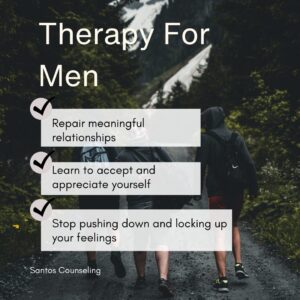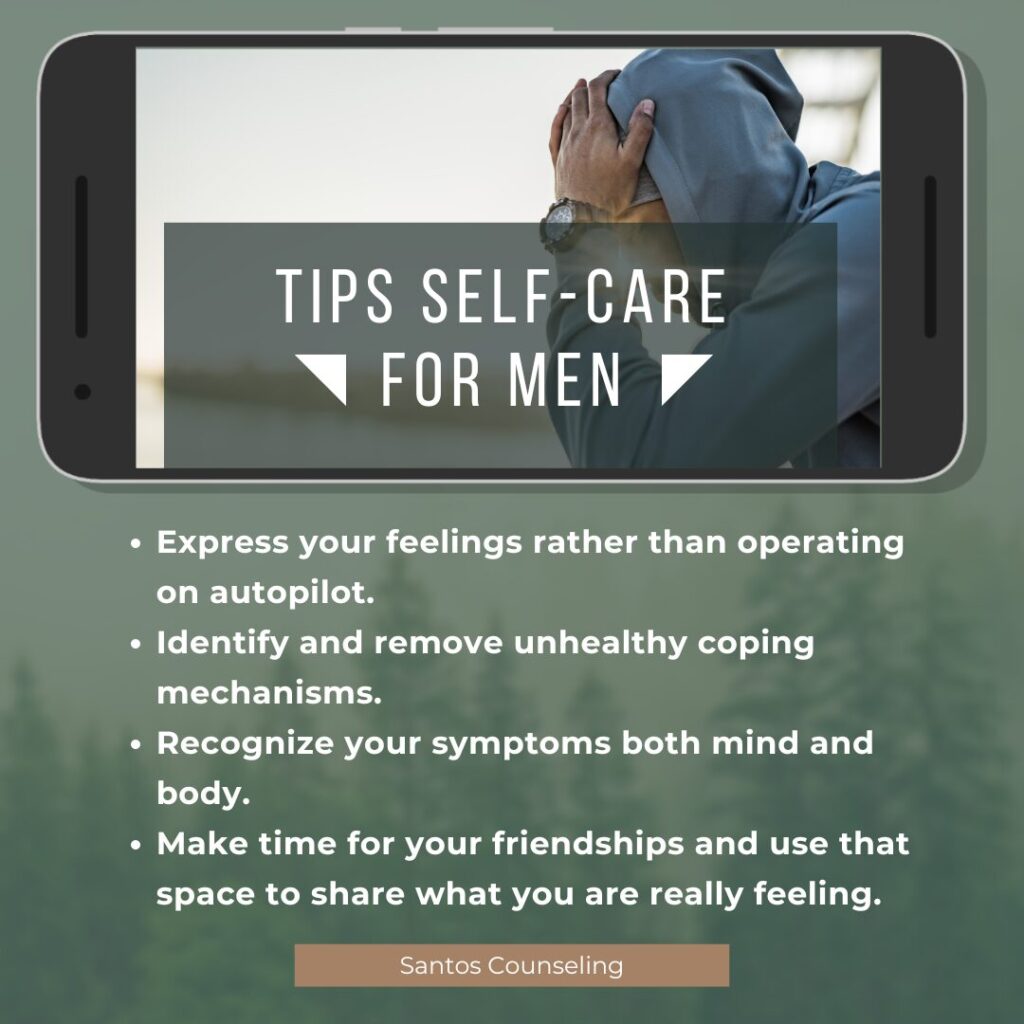Therapy For Men In Greensboro, North Carolina
Are you seeking a male counselor that gets you? That can sit with you, talk about barriers, show compassion, and understand your unique experiences and perspectives.
When people seek counseling with Santos Counseling, they often look for someone who can truly understand them. Our team of counselors aim to give you a space where you feel understand. For this means that their is a preference in the type of counselor they work with. Finding a counselor that hold specific mental health training or who shares certain characteristics is important.
This reading aims to help you explore why someone might seek a male counselor, the benefits of doing so, and how to find the right fit. Our goal at Santos Counseling is simple. We want you to feel comfortable with your counselor.

Therapy can have many benefits for men:
- Increase awareness of what you are feeling.
- Improve confidence and self-esteem.
- Learn how to practice healthy copings skills.
- Address emotional challenges connected to depression, anxiety, and other emotional difficulties.
3 Barriers Men Experience In Seeking Counseling
I thought it would be helpful to explore barriers and the importance of finding the right counselor. Santos Counseling open it’s doors to the Greensboro and surrounding community in 2014. We have learned from our clients the importance in breaking barriers and creating a practice focused on the client and counselor relationship. To add this point, take a look at ACA article, The Recipe for Truly Great Counseling by clicking here.
1. Understanding of Societal Pressures.
Men often start counseling because of challenges connected to societal pressures. The challenges typically lead to men keeping feelings and thoughts to themselves. Keeping things to oneself overtime leads to pressure building and we know what takes place when too much pressure gets built up.
Working with a counselor can help men get a clear understanding of common societal pressure and learn how to get away from suppressing emotions or conforming to traditional roles.
Working with a male counselor can provide a unique perspective. This is very similar to working with a counselor who has personally lived an experience you have or one that may share a cultural connection to you. This is not a clear indicator of success, instead it is a factor that can help the process of counseling.
Having a shared understanding with your counselor can create a stronger connection and foster a sense of safety.
2. Men Overcoming The Fear of Therapy
Research suggests that having a male counselor can give you a constructive space where you can challenge maladaptive thoughts. I encourage you to consider what fears or even worries do you hold that keep you from working with a counselor? Are they connected to who the counselor is? Would having a male counselor make the process easier?
The AAMC bring attention that men often struggle to seek counseling due to bias and assumptions connected to how men should be, societal pressures, fear of judgment from friends, family, and peers.
3. Suppressing Feelings
Often men will experience a unique type of upbringing that is filled with messages of ignoring issues, being strong, not being weak, or being told to not show emotion. The suppression of feelings can lead men to feel overly stressed and overwhelmed.
When it comes to seeking counseling, men often experience a push from society that they need to talk about their feelings. This can often make men feel pressured, uneasy, and embarrassed about what they are going through.
It’s important for men to know that ignoring emotions and suppressing them can negatively impact the body. When your body holds everything in, it’s likely that you’ll experience physical pain, racing heart-rate, difficulty breathing, and other unwanted feelings.
What does the research say about men and mental health?
When it comes to men and mental health, we must hold awareness of suicide. According to the CDC suicide is a leading cause of death among men. According to the National Institute of Mental Health (NIMH) 1 in 5 adults experience a mental health difficult. The research is connected to the U.S.
Research from Harvard Health Publishing Medical School depression is listed as one of the most common reasons that men seeking counseling. What I encourage you to consider is the list of factors, events, or experiences that can lead to depression. Men may experience adverse childhood experiences (ACE) or life transitions that can trigger unwanted and difficult symptoms of depression.
What Are The Common Reasons Men Seek Therapy
Men often seek counseling to focus on addressing mental health difficulties connected to depression, challenging early childhood experiences, marriage, and work issues. Below are common reasons that men seek counseling:
- Address stress connected to work and career.
- To learn how to create balance between work and family.
- Work on becoming a better parent.
- Heal from past childhood and early experiences that are continuing to impact you to.
- Develop healthy coping skills to address emotional difficulties connected to depression, grief, anxiety, or stress.

What are signs and symptoms of mental disorders in men?
Most people show specific sign and symptoms when it comes to mental health. Common examples include headaches, feeling on edge, problems focusing and concentrating, comparison, muscle tension, or sadness. Below are signs and symptoms that men experience in connection to mental health. As you review each, keep in mind how the sign or symptom impacts your mental health.
1. Physical Pain.
Men often share that they are getting headaches or muscle tension. The physical pain is often associated with mental health symptoms.
2. Social Isolation.
I think most adults can relate to the social struggle that making and maintaining friends in adulthood comes with its challenges. A study from Psychiatry Research discussed risk of loneliness being associated to dementia and cognitve decline, depression, heart disease, obesity, and premature death.
3. Significant/Unexpected Life Changes
Being able to cope with unexpected life changes requires a level of resilience, compassion, and patience. Many people will often try to avoid changes by spending energy on creating ways to avoid it. A common sign of needing to work with a counselor is the mental health impact that comes with an unexpected life change. Common unexpected life changes include job loss, divorce, the passing of a loved one, and other difficult life experiences.
For more supportive reads on mental health click the links below:
